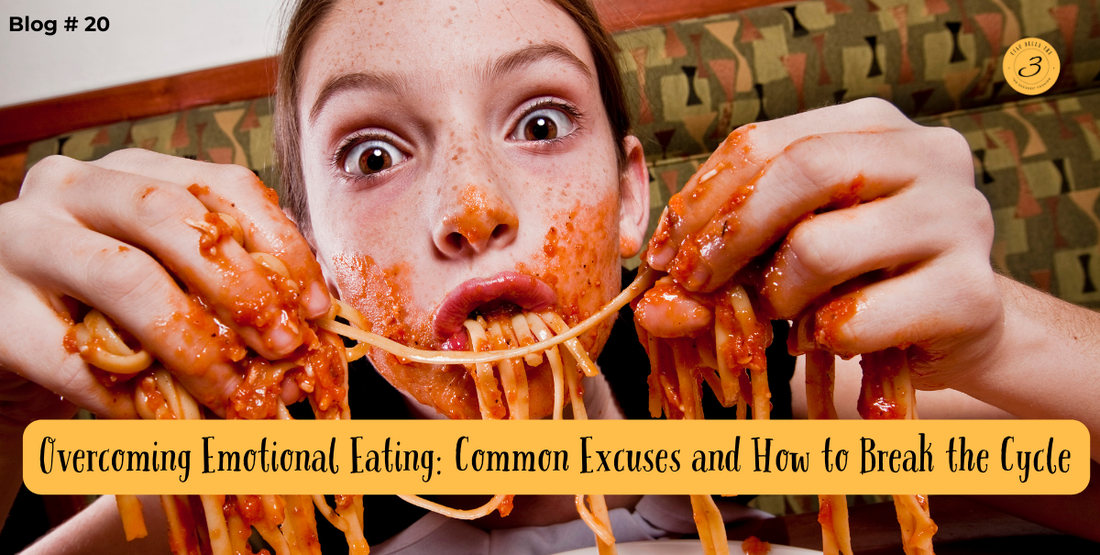
Overcoming Emotional Eating: Common Excuses and How to Break the Cycle
Share
I Am an Emotional Eater: The Struggles We Face
Hi everyone,
Today, I want to talk about something really important that a lot of us go through but don’t always talk about—emotional eating. You might be wondering what emotional eating is. Well, it’s when we eat not because we’re hungry, but because we’re feeling some kind of strong emotion, like being sad, stressed, or even bored.
What Is Emotional Eating?
Emotional eating is when we use food to make ourselves feel better. Instead of eating to satisfy our hunger, we eat to satisfy our emotions. Imagine having a rough day at school or a fight with a friend. Instead of dealing with those feelings, you grab a bag of chips or a tub of ice cream. It’s like food becomes a big, tasty hug.
Why Do We Do It?
There are many reasons why we turn to food when we’re emotional. Sometimes, it’s because food can be comforting. Think about your favorite meal—maybe it reminds you of home or a happy memory. When we’re feeling down, eating that food can bring back those good feelings, even if it’s just for a little while.
Excuses We Tell Ourselves
Now, let’s talk about the excuses we often make when we can’t lose weight, especially as women. We all have those moments where we say things to make ourselves feel better about not reaching our weight goals. Here are some common excuses:
-
"I’ll Start Tomorrow"
- How many times have you said this? It’s so easy to put things off, thinking we’ll have more willpower or energy tomorrow. But guess what? Tomorrow turns into next week, and then next month.
-
"I Deserve This"
- After a long, stressful day, it’s easy to convince ourselves that we deserve that piece of cake or those extra cookies. While it’s important to treat ourselves sometimes, doing it too often can become a problem.
-
"I Don’t Have Time"
- Life can be super busy, and finding time to cook healthy meals or exercise can seem impossible. But making time for ourselves and our health is crucial, even if it means small changes like a quick walk or a simple, healthy snack.
-
"Healthy Food Is Too Expensive"
- It’s true that some healthy foods can be pricey, but there are also affordable options like fruits, veggies, and whole grains. Plus, investing in our health now can save us from bigger health problems later.
Breaking the Cycle
So, how do we stop emotional eating and start making healthier choices? Here are a few tips:
-
Recognize Your Triggers
- Try to notice what emotions make you want to eat. Is it stress? Sadness? Boredom? Once you know your triggers, you can find other ways to cope, like talking to a friend, going for a walk, or listening to music.
-
Find Healthy Alternatives
- Instead of reaching for junk food, try to have healthier snacks on hand. Fresh fruit, nuts, or yogurt can be satisfying without being unhealthy.
-
Practice Mindful Eating
- Pay attention to what you’re eating and why. Eat slowly and enjoy each bite. This can help you feel more satisfied and less likely to overeat.
-
Be Kind to Yourself
- It’s okay to have setbacks. Don’t beat yourself up if you slip up. Remember that every day is a new chance to make better choices.
In the spirit of sharing debunking out excuses, we've designed these funny inspirational shirt Excuse #8 I'm An Emotional Eater... Crewneck Sweatshirt and tee available at Ciaobellatre.com If you're interested, check it out. Remember, purchasing through this link may support the blog at no additional cost to you.
Emotional eating is a common struggle, and it’s something many of us deal with. By recognizing our excuses and finding healthier ways to cope with our emotions, we can start making positive changes. Remember, it’s not about being perfect—it’s about making progress and taking care of ourselves one step at a time.
Thanks for reading, and remember, you’re not alone in this!
Until next time,
Disclaimer: This blog is based on personal perspective and is not medical advice. For professional guidance, please consult a healthcare provider.


